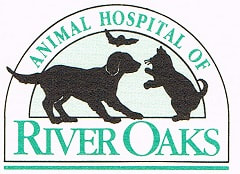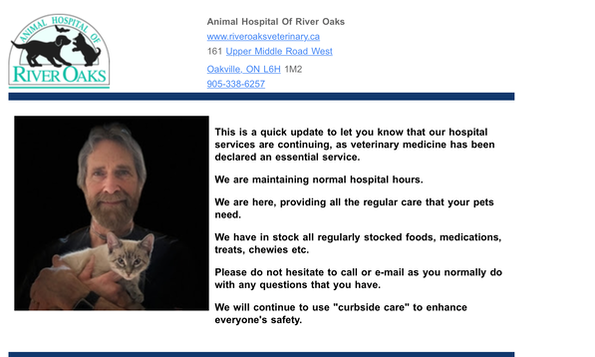|
Here is an article written by Dr. Gold, published June 2020 by the College of Veterinarians of Ontario in their public Newsletter: (Click on the link to see the full newsletter) http://cvo.informz.ca/z/cjUucD9taT0xMjAzMzg4JnA9MSZ1PTkwNjQ3NzczNCZsaT0xOTI5MjQ0Mg/index.html Practising companion animal veterinary medicine during a world health crisis By: Dr. Lorie Gold For the past 40 years veterinarians have been working hard to teach animal owners that the best care is preventative care. Years ago veterinarians used to practice medicine like firefighters did their work...putting out fires when they happened. In other words, when an animal got sick or injured, veterinarians would be called to diagnose and treat the illness or injury. Preventative medicine is a different approach. With regular checkups and a program of care for each patient, veterinarians in recent decades could help to maintain the health of our patients in a more proactive manner. By conducting examinations on a regular basis we find out about problems while they are still minor and treatment planning prevents them from becoming major health issues. Wellness examinations and routine blood work detect diseases not yet showing any symptoms to their families. Vaccinating against common contagious, infectious diseases allows us to make these conditions rare. Dental care helps to maintain patient health. By prescribing anti-parasitic medications along with appropriate blood and fecal testing we prevent diseases caused by or passed on by parasites. COVID-19 changed all of this. From a veterinary team’s perspective it has been like a step backwards in time. While veterinary care was deemed an “essential service” for the first week of the shut down associated with the pandemic (in Ontario), within a week we were restricted to “urgent care” only. This meant back to “putting out fires”; treating animals only as needed when families noted problems themselves. The first changes we had to put into place were changes in support of social distancing. Veterinary teams always work hard to ensure that our reception areas are welcoming to clients, families and our patients. With the need to maintain social distancing, we suddenly had to introduce a whole new style of practice, called “curbside care”. This means that veterinary hospitals are keeping their front door locked, with clients no longer coming inside our hospitals. Instead, clients call from their cars when they arrive, a staff member wearing personal protective equipment goes out to the car, brings the pet into the hospital and the veterinarian conducts the examination while using the telephone to communicate with the client in the car. The second major change that many practices put into place is a more regular use of telemedicine. In support of social distancing the College of Veterinarians of Ontario temporarily enhanced (during the pandemic) the ability of veterinarians to use telemedicine to help families and their pets. Telemedicine procedures give us the opportunity to diagnose and prescribe for patients without a physical examination, utilizing client’s observations, e-mailing of photos, videos and video-conferencing. Veterinarians are used to touching our patients. We look, palpate and even smell our patients as part of our diagnostic protocols. We run blood tests, urine tests, we take radiographs (X-rays) and we do ultrasound examinations. Treating patients by telemedicine is limited, as sometimes we need these diagnostic tests to accurately diagnose our patients and to set up a treatment plan. Telemedicine is a good tool, but it does have its limits, and therefore there are patients that need to be seen, to be helped. Using our curbside care protocols we manage to see these patients as needed. For two months practices have been working harder for the care of less patients. Harder because of the work associated with ensuring an even higher level of disinfection than the already present hospital protocols. Harder as we work to schedule our hospitals, to try to maintain work for our wonderful caring staff, while managing the financial crisis of a limited practice. Harder while we wear personal protective equipment in our hospitals, trying to keep our staff and ourselves safe. By definition, when treating our patients, it is not possible to maintain two meters between team members. Generally at least one staff member is holding the patient while the veterinarian examines the patient and the veterinarian or the veterinary technician takes samples, run tests and administers medications. On Thurs., May 14, 2020 the Premier of Ontario announced the government’s intention to allow veterinary medicine to go back to full service care starting May 19, 2020. Social distancing rules are appropriately still in place. Veterinary hospitals are generally not designed such that staff and clients can keep two metres spacing, so curbside care will still be the “new norm” for some time to come, certainly for months, possibly a year or more. Veterinarians and their teams will now be transitioning to this next stage of practising during the COVID-19 pandemic. You will find that your veterinarian will be more readily available to you now with full hospital services but with appropriate protections and curbside care. Clients will continue to wait outside while their patients are assessed and cared for. Veterinary hospitals will be working through the steps needed to re-open closed practices, increase hours available, and to bring staff back to work. COVID-19 pandemic protocols have put our profession through major changes. It has been stressful on many levels but veterinarians and our teams do have new procedures in place, and we will continue to be nimble in our approach to veterinary care so that you, your families and your pets can continue to receive the best veterinary care possible, as we all work to keep safe while we manage and go through this global pandemic. Dr. Gold is 2nd vice-president of the College of Veterinarians of Ontario. Dr. Gold is a companion animal veterinarian and he owns the Animal Hospital of River Oaks in Oakville. COVID-19 UPDATE May 12, 2020 HEARTWORM SEASON June 1st is rapidly approaching and as our dog owning families know, HEARTWORM SEASON is from June through to and including November. As a reminder, heartworm disease is predominantly a dog disease that is literally a disease of worms in the heart, which they get from mosquito bites. This serious and potentially deadly disease gets passed on through bites from infected mosquitos. The parasite is warm weather temperature dependent, and that is why we have the seasonal nature of the disease. You do want your dog protected, starting June 1st.The normal veterinary process is to run a blood parasite test every spring on every dog, before starting his or her heartworm preventative medication. This year because of the current COVID-19 protocols in place the Ontario Veterinary Medical Association has published a suggested guide advising veterinarians to dispense the medication for our patients, so that disease can be prevented, and we will "catch up" with the blood test as soon as the "urgent care" restrictions are lifted. Please click this link for a short video we have recorded on heartworm disease and the prevention of this serious condition in your beloved dog. Youtube Video - Dr. Gold discusses Heartworm Please e-mail or phone us so that we can prepare the prescription for your dog. We have a number of preventative medications available. Many of our families will want to stay with the same medication that their dog had last year, but there are a number of options to consider. Please watch the quick video that we have prepared for you, (with the above link) and then reach out to us so that we can help you to protect your special canine family member. TICK TALK. Ticks have become common. We are seeing ticks on our patients every week. We have medication available that kills ticks when they bite our pets. Some of the Heartworm prevention medications also kill ticks. You will hear more from us about ticks in a later newsletter. Please click on the following link for a very short video on TICKS You Tube Video - Dr. Gold briefly discusses TICKS URGENT CARE RESTRICTIONS are still in place. Our veterinary hospital is open to see patients, for urgent care. The decision on whether the concern is urgent or not is to be determined on a case by case basis, so please call or e-mail your every concern and we will help you by deciding if it is a matter than can be postponed, helped via a telemedicine consultation or whether your pet should be presented for a full physical examination. As soon as the "URGENT CARE" restrictions are lifted and veterinary medicine goes back to "ESSENTIAL SERVICES", we will contact you to let you know that we will once again be able to accommodate wellness examinations, annual physical examinations with vaccination appointments and most importantly run the HEARTWORM blood testing. HOURS 10 am to 4 pm Monday to Friday, until further notice
26 Comments
|
Our creative team at the Animal Hospital of River Oaks take pride in providing educational information as well as keeping our River Oaks's Families well informed in up-coming events happening at the hospital! Archives
June 2020
Categorieshttps://api.pethealthnetworkpro.com/v1/practices/9b0cebb5-40b2-8d36-d4c2-60de940a795b/survey-responses
|
|
Our Practice:
Animal Hospital of River Oaks 161 Old Upper Middle Rd Oakville, ON L6H 1M2 P: 905-338-6257 905-338-0267 [email protected] Follow us on: FACEBOOK - we have a lot of fun pictures and videos, so please click below on the "f" for a link to our facebook page, and enjoy! Site powered by Weebly. Managed by IDEXX Laboratories
|


